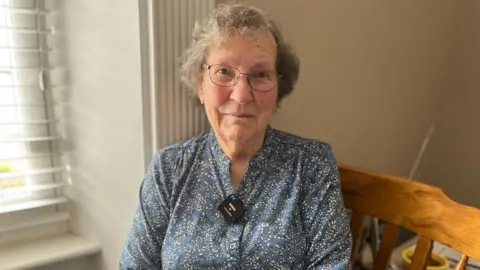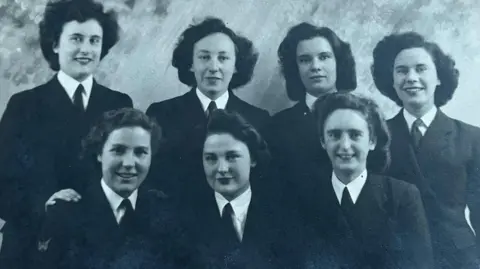WW2 Wren listened to German messages from Guernsey
 BBC
BBCA Guernsey woman serving as a Wren in World War Two unknowingly intercepted messages from her home island.
Barbara Quevâtre was 14 when she was evacuated from Guernsey ahead of its occupation by German forces.
Keen to help out she joined the Women's Royal Naval Service in 1944 with the hope of becoming a wireless telegraphist.
The 98-year-old said it was the most important time of her life and she only discovered last year that some of the coded messages she had intercepted were sent from Guernsey.
Mrs Quevâtre has been sharing her memories with BBC Guernsey as part of The Island Memories Project to create a digital audio archive of WW2 memories.
After completing her training she was told she would focus on German submarine messages.
She had to learn German and international Q codes, three letter codes used in radio communication, as well as being able to understand morse code at 32 words per minute.
"That was quite fast considering the British Navy were only trained up to 18 words a minute," she said.
 Barbara Quevâtre
Barbara QuevâtreMrs Quevâtre worked at a remote underground signal station, with 50 Wrens in each shift.
She remembers it well: "I was listening in to what was supposed to be a commercial station but was actually run by the Germans.
"That was hard work, but I coped with it all right."
After D-Day, on the 6 June 1944, she was put to work listening to the Channel Islands frequency.
She thought she was listening to messages being sent from Jersey.
"But no, it was Guernsey, call sign 'F L U'. I found out just this last year," she said.
The revelation came following a visit to the German Naval Signals HQ Museum in Guernsey: "I found out Guernsey was in charge of all the Cherbourg area and the Channel Islands."
Signal the attack
Mrs Quevâtre then began listening to the Paris headquarters of the German Navy.
"If we heard a message from a submarine, they'd send a 'w w' message, which was supposed to be a weather report."
"It actually meant they had sighted a convoy.
She then had to listen out for the message signalling they were about to attack.
British direction finders would simultaneously be trying to triangulate where the submarine was based on its signal.
The results of their work was not always known.
She said while listening to traffic from the islands: "I did hear that we had located a submarine in the harbour.
"The RAF went over but by the time they got there it had gone."
Of her time as a Wren she said: "That experience certainly shaped my life. It's what stays with me more than anything."
Follow BBC Guernsey on X and Facebook. Send your story ideas to [email protected].
